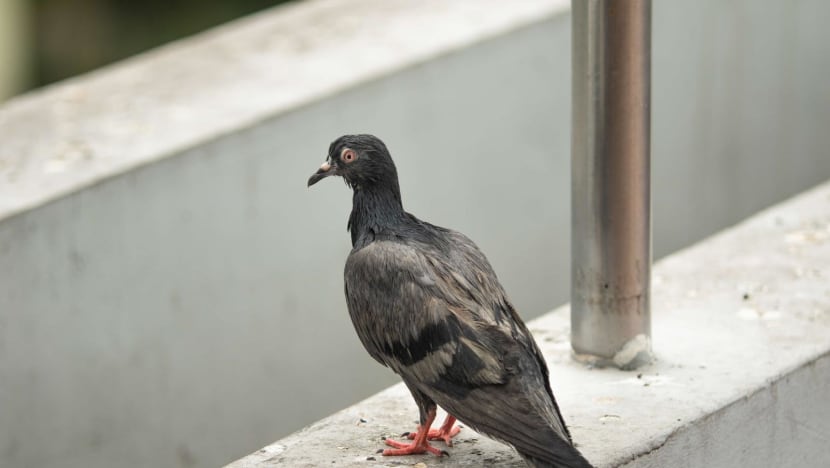Pigeon management plan to be rolled out in three more town councils
The estimated pigeon population in Ang Mo Kio, Bishan-Toa Payoh and Tanjong Pagar - where a pilot programme was launched - went down by 50 per cent.

The next phase of the pigeon management plan will be rolled out at Jalan Besar, Marsiling-Yew Tee and Nee Soon Town Council for a duration of six to nine months. (Photo: NParks/Bryan Lim)

This audio is generated by an AI tool.
SINGAPORE: A pigeon management plan introduced in several town councils in a pilot programme in 2024 will be extended to three more areas.
The next phase will be rolled out in Jalan Besar, Marsiling-Yew Tee and Nee Soon town councils from June for a duration of six to nine months.
If successful, the plan will be scaled up across Singapore to help manage the pigeon population, said Senior Minister of State for National Development Tan Kiat How on Tuesday (May 20).
The initial pilot programme was implemented in three town council estates with large clusters of pigeons - Ang Mo Kio, Bishan-Toa Payoh and Tanjong Pagar.
The pilot, which was carried out from July 2024 to March 2025, saw the pigeon population in the three town councils decrease by about 50 per cent.
Pigeon-related feedback within the three town councils from October 2024 to March 2025 was also about 34 per cent lower than the expected average, NParks said in an update on Tuesday.
Actions such as surveillance were carried out at bird feeding hotspots, and NParks took enforcement action against 50 cases of bird feeding.
Direct population control measures were also carried out to bring down the pigeon numbers.
PIGEON MANAGEMENT PLAN
The National Parks Board (NParks) said it worked with several government agencies, residents and members of the public on the pigeon management plan, which focused on population control, public education and community stewardship.
Measures included reducing human-generated food sources and direct population control, said NParks.
Under the pilot plan, NParks worked with the town councils to step up pigeon removal efforts, "with physical trapping and humane euthanasia to bring down the pigeon population at hotspots" within the areas.
NParks also advised the town councils on proper removal methods and developed a set of guidelines for the use of alpha-chloralose, a substance that kills birds.
NParks monitored feedback on illegal bird feeding and conducted surveillance, which included physical surveillance and the deployment of CCTV cameras at identified feeding hotspots, as well as enforcement against bird-feeding.
The National Environment Agency (NEA) and the Singapore Food Agency (SFA) also worked with the town councils as well as other stakeholders such as the hawkers’ associations, managing agent, food establishment operators and cleaning contractors to improve refuse and food waste management at bin centres and food establishments.
These included ensuring non-spillage of trash between bin chutes and bin centres, as well as prompt clearance of food waste, trays and dirty crockery at tray return racks and refuse bins.
Engagement and public education sessions were also conducted by SFA and NParks.
During these sessions, SFA distributed educational materials on improving refuse management, housekeeping, and cleanliness practices.
NParks, meanwhile, informed the public on the need to maintain the cleanliness of the environment and to refrain from feeding pigeons.
It also collaborated with Active Ageing Centres to conduct sessions in the three town councils.
The sessions aimed to raise awareness among the elderly on the negative impacts of bird feeding, it said.
NParks reminded that it encouraged feeders to consider nature-based activities as alternatives to feeding pigeons.
"These include community gardening, which creates opportunities for them to be engaged socially with others, and birdwatching, where they can observe how wild birds forage naturally without human-generated food sources," it said.
It will continue working with agencies to understand the motivations of repeat offenders who feed birds.
NParks will also address misconceptions and discourage them from doing so.
For individuals with mental health needs, the Agency for Integrated Care will link them with appropriate services, such as counselling, for support.


















